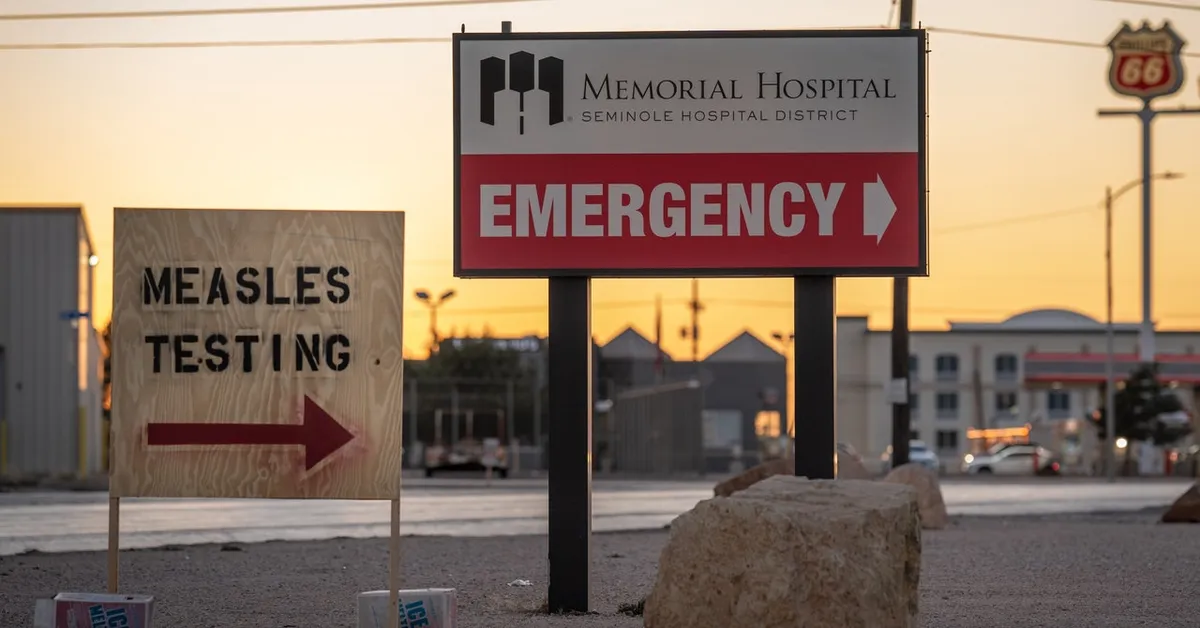
A significant outbreak of measles in West Texas has raised alarm bells, with current reports indicating at least 146 confirmed cases. Tragically, the outbreak has resulted in 20 individuals being hospitalized and the death of one unvaccinated school-age child. The outbreak predominantly affects unvaccinated children, prompting health officials to issue a stark warning against the dangerous trend of “measles parties.”
During a recent press briefing held by the city of Lubbock, Texas, Ron Cook, the chief health officer at the Texas Tech University Health Sciences Center, emphasized the risks associated with such gatherings. “What I want you to hear is: It's not good to go have measles parties because what may happen is—we can't predict who's going to do poorly with measles, be hospitalized, potentially get pneumonia or encephalitis, and or pass away from this,” Cook stated. He strongly advised, “The best thing to do is make sure that you're well vaccinated.”
Lubbock is located approximately 90 miles northwest of Gaines County, the epicenter of the outbreak, which has one of the lowest vaccination rates in the state. Out of the 146 cases reported, Gaines County alone accounts for 98. While Lubbock has confirmed only two cases, it has treated patients from surrounding areas, including the child who recently succumbed to the infection, who was not a Lubbock resident.
Despite the seriousness of the situation, there are concerns that measles parties might still be discussed among parents. Cook noted that these parties are largely a topic of conversation on social media, reminiscent of practices from decades past when vaccines for diseases like measles and chickenpox were not available. He reiterated the dangers of such events, stating, “Please don't do that. It's just foolishness; it's playing roulette.”
Health officials, including Lubbock's director of public health, Katherine Wells, expressed concerns that the outbreak, now spanning nine counties in Texas, shows no signs of abating. “This outbreak is going to continue to grow,” Wells cautioned, without providing a specific prediction on the total number of cases. Notably, 116 of the 146 cases involve individuals under the age of 18, and only five patients had received at least one dose of the measles, mumps, and rubella (MMR) vaccine.
On a more encouraging note, Wells reported an increase in vaccination rates, as some previously hesitant parents are now opting to vaccinate their children. She highlighted that over 50 children sought measles vaccinations at a clinic in Lubbock, including eleven children who had previously received vaccine exemptions. “Which is a really good sign; that means our message is getting out there,” Wells commented.
Since the outbreak began in late January, the primary messaging regarding the importance of vaccination has come from state and local health authorities. The Centers for Disease Control and Prevention (CDC) issued a brief statement acknowledging that “vaccination remains the best defense against measles infection,” although it was not widely disseminated.
During a cabinet meeting, U.S. health secretary Robert F. Kennedy Jr., known for his anti-vaccine stance, made several inaccurate claims about the outbreak, including downplaying its severity. Epidemiologist Katelyn Jetelina pointed out that the number of measles cases in the U.S. has already surpassed totals from eight of the previous 15 years, emphasizing the unusual nature of this year's outbreak.
Cook addressed misinformation regarding hospitalizations, clarifying that most patients are admitted due to severe symptoms rather than for quarantine purposes. “Most of them are either severely dehydrated from just the infection itself, and/or lots of low oxygen levels—hypoxia. And that's from the inflammation in the lungs,” he explained. Some patients may require supplemental oxygen or even intubation, highlighting the serious nature of the illness.
As the outbreak continues, rumors have circulated suggesting that the measles virus was introduced to the area by undocumented immigrants. Wells dismissed these claims, stating there is no evidence to support such assertions, noting that most outbreaks in the U.S. stem from unvaccinated individuals returning from international travel.
In summary, the current measles outbreak in Texas underscores the critical importance of vaccination and public health awareness. The Texas health authority's warning against measles parties serves as a crucial reminder to prioritize health and safety during this concerning time.